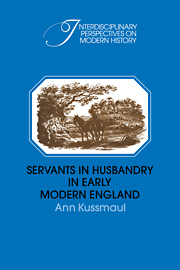Book contents
- Frontmatter
- Contents
- List of figures
- List of tables
- TO MY PARENTS
- Preface
- Part I Servants and labourers
- Part II Form and practice
- Part III Change
- 6 Cycles: 1540–1790
- 7 Extinction
- Appendix 1 ‘Servants’ and ‘labourers’ in early modern English
- Appendix 2 Age and sex
- Appendix 3 Legal control of mobility
- Appendix 4 Statute Sessions and hiring fairs in England, sixteenth to nineteenth centuries
- Appendix 5 The Holland, Lincolnshire, Statute Sessions
- Appendix 6 Compulsory service
- Appendix 7 Speculations on the origin of the institution
- Appendix 8 The 1831 census
- Notes
- Bibliography
- Index
- Frontmatter
- Contents
- List of figures
- List of tables
- TO MY PARENTS
- Preface
- Part I Servants and labourers
- Part II Form and practice
- Part III Change
- 6 Cycles: 1540–1790
- 7 Extinction
- Appendix 1 ‘Servants’ and ‘labourers’ in early modern English
- Appendix 2 Age and sex
- Appendix 3 Legal control of mobility
- Appendix 4 Statute Sessions and hiring fairs in England, sixteenth to nineteenth centuries
- Appendix 5 The Holland, Lincolnshire, Statute Sessions
- Appendix 6 Compulsory service
- Appendix 7 Speculations on the origin of the institution
- Appendix 8 The 1831 census
- Notes
- Bibliography
- Index
Summary
The incidence of service in husbandry did not remain fixed, but rose and fell in two major cycles from c. 1450 to c. 1900. Only the first phase of the second cycle, the abandonment of service in the late eighteenth and early nineteenth centuries, has been generally noted by modern historians. Board of Agriculture reports, Parliamentary Papers, and the 1851 census all strongly attest to this collapse, at least in the south and east. Before that, however, the incidence of service had declined from a probable high point in the fifteenth century to a trough in the mid seventeenth century, and then rose sharply to a second peak in the mid eighteenth century. After the mid nineteenth century, in the north and west, the incidence rose once again.
Changes after 1790 can be directly observed and will be considered in the next chapter. Before 1790, the evidence is indirect. The parish listings of Chapter 2, which do not contradict the argument of cyclical motion, are too few and too scattered to bear the weight of a cyclical interpretation. The measure that reveals the cycles is the proportion of marriages celebrated in October in the rural south and east, where Michaelmas was the date at which servants' contracts began and ended. We have seen that service was for most a stage in life between childhood and married adulthood.
- Type
- Chapter
- Information
- Servants in Husbandry in Early Modern England , pp. 97 - 119Publisher: Cambridge University PressPrint publication year: 1981
- 2
- Cited by



